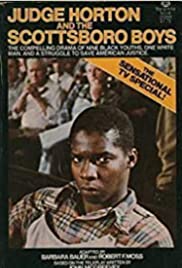
JUDGE HORTON AND THE SCOTSBORRO BOYS
US, 1976, 105 minutes, Colour.
Arthur Hill, Vera Miles.
Directed by Fielder Cook.
Judge Horton and the Scottsboro Boys is an impressive telemovie. It focuses on racial issues in a 30's Alabama setting. It also shows justice and injustice in the legal system of the time and in this Place. It is a plea for human justice. The film is based on a true-story. Arthur Hill is excellent as Judge Jim Horton, one of the best performances of his career. Vera Miles appears as his wife.
The film focuses on an episode of a clash between white and blacks on a train and the claim by two young women that they had been raped by the blacks. There were many trials of the blacks - always being found guilty. However, the Supreme Court asked for a retrial and Judge Horton is fairly upset at the mob violence and attitudes of the townspeople at the way the jury gave a guilty verdict. As a consequence of his intervention for justice, he was defeated in his next campaign for being re-elected judge and never held public office again. A thoughtful piece of Americana.
1. Americana? Race issues, justice and the law?
2. The impact of the film as a telemovie, for the wide popular audience? Its treatment of serious themes for the home audience? Re-creation of Alabama in the early 30's, the-town of Decatur? The sense of period? Costumes, decor, atmosphere? Musical score?
3. The introduction to Jim Horton, his explanation of the South and of Alabama? Of his own work? His status in the community? His loving relation ship with his wife, her support? Her final comments? The information at the end about his intervention, his not being re-elected, his not holding public office? What had he achieved? The importance for jury of peers (and a total white jury not sitting for a black defendant, the right of everyone to counsel?)
4. The atmosphere of the South in the 30's, memories of the Civil War, slavery, antagonism towards the North, anti-Semitic and other racial attitudes? Alabama as typical? Tension between white and black? The manifestations of bigotry - even in the courts?
5. Themes of justice and justice being seen to be done? Prejudice and bigotry? The mobs, the heritage of lynching? Inflammatory speeches by Counsel? The decisions of the jury?
6. The basic situation: the train, the whites, the clash with the blacks, the whites being thrown off the train? Lester Cole and his reporting to the Station Master, the phone call, the police waiting? Victoria Price and the accusation of rape? The importance of the flashbacks to show the characters, what actually happened? Victoria Price's lies?
7. The portrait of the Scottsboro boys - as a group, individuals? The depression wanting work? Ill health? On the train, the fight? Victoria Price's accusations, their answers to the police, self-defence? in jail and the effect of jail on them? The number of trials, re-trials? on the witness stand? Victims of society? The long explanations of what happened to them - in serving prison time, in release, in parole? Their disappearing from society? The effect of their imprisonment and false accusations? Mental deterioration, further crimes, further accusations? Victims?
8. Jim Horton as a respected citizen, the meal with his friends and their talk? The ambitions, his career? His car being fixed and the request to preside at the re-trial? Thinking it over, discussing it with his wife? Accepting?
9. The quality of his presiding at the case, listening, fair to objections, his antagonism towards mob violence, the warnings? The young doctor telling him the truth and his anger? His treatment of the two lawyers? Moving a chair to listen to Ruby? His summing up, his decision about the jury's verdict? The appeal? His friends ignoring, him? A upright and honest man?
10. The sketch of the business men of Alabama, business, political connections? Racial attitudes? Friendship with Horton? Despising him for his stand and taking himself too seriously?
11. Liebowitz and Brodsky as the defence lawyers? Being accused of communism? Their work with the NAACP? Liebowitz as stern, warned not to attack Victoria? His treatment of her as a witness, attacking her credibility and morals? The seriousness of his attack? His questioning the witnesses, the doctor, Lester and his happy-go-lucky re-creation of the sequence of events? Ruby and her conversion? The clashes with Knight? His plea? Objection to bigotry, inflammatory speeches, anti-Semitism? How good a job did he do defending ? His subsequent career?
12. The contrast with Knight, the District Attorney of the area, his aggressive interrogation, inflammatory speeches, intimidation of the witnesses? His deferring to Victoria? Ridiculing Lester and Ruby, their protection, their clothes? His final speech? His subsequent heart attack and death?
13. Victoria and-her appearance, reputation, performance in the witness box, lies, bigotry? Antagonism towards Liebowitz? Her arrogance? The contrast with the flashbacks and her relationship with the boys, her engineering the rape accusations, pressure on Ruby? Ruby’s disappearance, the contrast, quiet, her conversion and her return to tell the truth? The hostile people?
14. Lester and being one of the boys, telling the story with bravado, telling the truth? The response of the men in the court?
15. The black witness and his seeing the girls, Knight dismissing his testimony?
16. The mob in the court, their reactions, laughter, anger? Dramatising bigotry?
17. The re-construction of the situation, the train model, evidence?
18. The evidence for the audience, for the jury? Reaction to the jury's decision? Judge Horton's reaction? Following through the consequences in terms of honesty and justice?